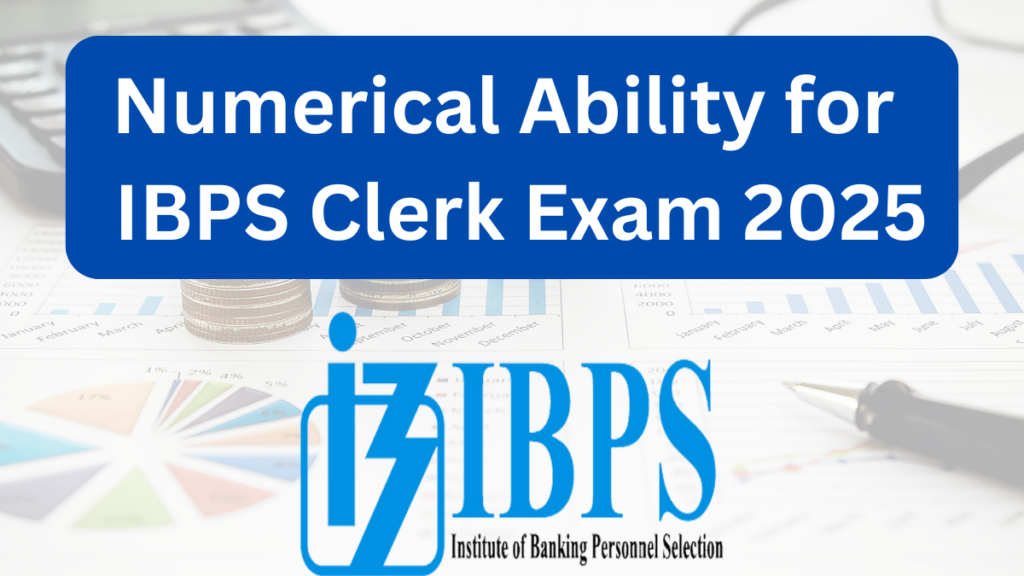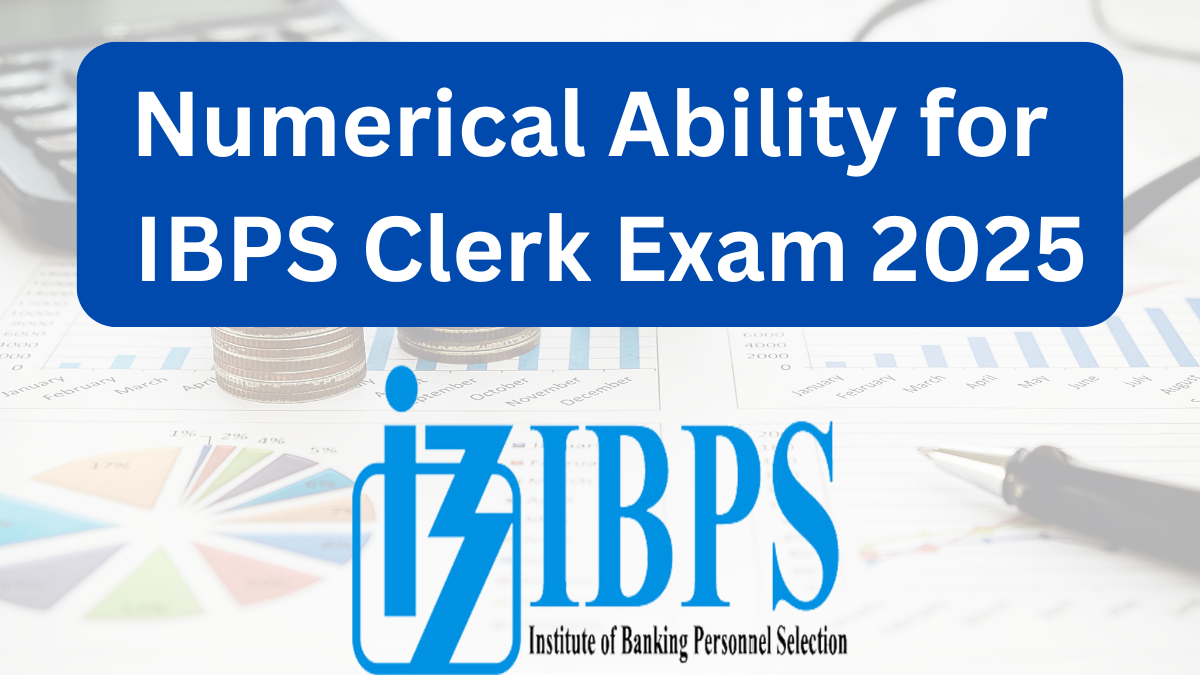The Numerical Ability section of the IBPS Clerk Exam has long been considered one of the most challenging parts of the exam. This section covers a wide range of mathematical concepts, from basic arithmetic to complex topics such as ratios, profit and loss, probability, interest calculations, and data interpretation. A strong performance in this section can significantly boost your overall score, making it essential to prepare effectively. In this guide, we will provide you with key insights, study strategies, and time management tips to help you tackle this section with confidence.

Understanding the IBPS Clerk Quantitative Aptitude Syllabus
The first step to mastering the Numerical Ability section is understanding the topics included in the syllabus. This section is present in both the preliminary and main stages of the IBPS Clerk Exam. A solid grasp of these fundamental mathematical concepts will help you perform better on test day. Below is a detailed breakdown of the key topics you need to focus on for the exam:
| Topic | Details |
|---|---|
| Time and Work | Problems related to calculating work efficiency, including joint work and individual work problems. |
| Ratio and Proportion | Questions about the relationship between quantities, including solving problems based on ratios and proportions. |
| Logarithms | Understanding logarithms, and solving exponential and logarithmic equations. |
| Distance and Time | Solving problems related to time, speed, and distance, including relative speed and time taken for a journey. |
| Data Interpretation | Analyzing data presented in tables, bar graphs, pie charts, and line charts to draw conclusions and solve problems. |
| Mixture and Allegation | Solving problems where different ingredients or solutions are mixed, and finding the proportion in which they should be mixed. |
| Profit, Discount & Loss | Questions on calculating profit, loss, and discounts, along with percentage-based problems. |
| Partnership, Stocks & Shares | Problems dealing with partnerships, investments, and stock market-related calculations. |
| Algebra | Solving algebraic equations, simplifying expressions, and working with variables. |
| Surface Area and Volume | Understanding and solving problems related to surface area and volume of 3D shapes like cylinders, spheres, and cubes. |
| Mensuration | Solving problems related to geometric shapes, including both 2D and 3D shapes, such as areas and volumes. |
| Equations & Probability | Solving linear and quadratic equations, along with basic probability problems. |
| Bar Graph, Pie Charts, & Tables | Working with different forms of data representation (graphs and tables) and interpreting them to solve problems. |
| Trigonometry | Solving problems involving angles, and trigonometric ratios like sine, cosine, and tangent. |
| Combinations & Permutations | Problems involving counting arrangements and combinations, useful for solving probability-related questions. |
| Speed, Time, and Clocks | Questions on the relationship between speed, time, and distance, as well as problems related to clock angles and time calculations. |
| Coded Inequalities & Syllogism | Logical reasoning problems involving coded inequalities, syllogism, and solving for conclusions based on given statements. |
| Simplification & Number Series | Problems requiring simplification of complex mathematical expressions and recognizing patterns in number sequences. |
Effective Time Management for the Numerical Ability Section
The Numerical Ability section in the IBPS Clerk Mains exam consists of 50 questions, each worth one mark, and the time limit is just 45 minutes. This makes time management a critical skill for success. Here’s how you can manage your time effectively:
1. Prioritize Easy Questions
-
Start by solving the questions you find easiest and quickest. Typically, questions from Data Interpretation, Simplification, and Quadratic Equations are easier and quicker to solve.
2. Limit Time per Question
-
Aim to spend no more than 35-40 seconds on each question. If a question is taking too long, move on and come back to it later if you have time.
3. Don’t Guess Recklessly
-
Negative marking is in place (0.25 marks deducted for each wrong answer). Avoid guessing answers unless you’re fairly certain.
4. Skip Challenging Questions
-
If a question is proving to be time-consuming or tricky, skip it. Focus on completing the questions you know well, leaving the difficult ones for later if time permits.
5. Practice Under Time Constraints
-
Regularly practice full-length mock tests under exam-like conditions. This will help you become familiar with the time constraints and improve your speed and accuracy.
Tips for Scoring High in the Numerical Ability Section
Maximizing your score in the Numerical Ability section requires a strategic approach. Below are some helpful tips to guide your preparation:
1. Build a Strong Foundation
-
Start by thoroughly understanding the fundamental concepts of each topic. Build your knowledge from basic arithmetic and gradually move to more complex topics like trigonometry and probability.
2. Solve a Variety of Problems
-
Practice solving a wide variety of problems from different topics. This helps you understand the different types of questions you might encounter in the exam.
3. Use Shortcuts and Tricks
-
Learn time-saving techniques for complex calculations. For example, mastering shortcuts for percentage calculations, speed-time-distance problems, and simplifying fractions can save you valuable seconds.
4. Consistent Practice with Mock Tests
-
Regularly take mock tests and review previous years’ question papers. This not only helps you identify the most common question types but also helps you gauge your progress and identify areas for improvement.
5. Focus on Weak Areas
-
Identify your weak topics and allocate extra time to improving them. Whether it’s solving algebraic equations or practicing data interpretation, dedicating more time to weaker areas can lead to significant improvements.
Frequently Asked Questions (FAQs)
Q1: What topics should I focus on in the Numerical Ability section of the IBPS Clerk exam?
-
Focus on core topics like Time and Work, Data Interpretation, Simplifications, Profit & Loss, Ratios, and Interest calculations. These are frequently tested and contribute significantly to your score.
Q2: How much time should I spend on each question in the IBPS Clerk exam?
-
Aim to spend 35-40 seconds on each question. If a question is too complex, move on and return to it later if time permits.
Q3: Is there a negative marking in the IBPS Clerk exam?
-
Yes, there is a negative marking. For each incorrect answer, 0.25 marks are deducted from your total score.
Q4: How can I improve my speed in solving numerical problems?
-
Practice regularly with mock tests, learn shortcuts, and aim to solve simpler questions first to build momentum. Consistent practice and focused efforts will help you improve both speed and accuracy.
Conclusion
The Numerical Ability section of the IBPS Clerk Exam 2025 is undoubtedly challenging, but with the right approach, you can conquer it. By thoroughly understanding the syllabus, managing your time effectively, practicing regularly, and mastering key concepts, you can greatly improve your performance. Stay consistent, and remember that every small effort you put into preparation will pay off on exam day. Best of luck with your IBPS Clerk Exam 2025!
Click here to learn more
Pari is a passionate writer known for captivating stories that blend imagination and reality. Inspired by travel, history, and everyday moments, Pari crafts narratives that resonate deeply with readers.




